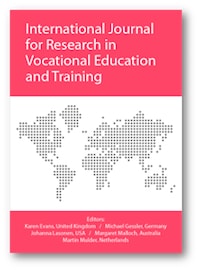
International Journal for Research in Vocational Education and Training
- OpenAccess
IJRVET International Journal for Research in Vocational Education and Training,正常發行
選擇卷期
- 期刊
- OpenAccess
The present study introduces a systemic model that demonstrates a description of the relationship between the labour-market and vocational education from the perspective of systemic theory. Based on the application of the relevant methodology, the two open social systems are identified and analyzed. Their key-features are presented and the points of contact are examined and linked, with the purpose to define more efficient manners of interrelation. This study has been conducted using information from the equivalent systems of Greece, as an example, and proposes this systemic method for further research in other countries as well.
- 期刊
- OpenAccess
The aim of this article is to explore the historical context of vocationalism in universities. It is based on an analysis of the history of the university from a vocational perspective. It looks for evidence of vocational engagement in the activities of universities over time, taking a long view from the birth of the Western University in the Middle Ages to the 1980s with the emergence of current issues of vocationalism in university education. It adopts a chronological perspective initially and then a thematic one. The main findings are: (1) vocationalism in university education is as old as the Western University itself, (2) there is evidence from the start of the Western University of vocational engagement in terms of the provision of vocationally relevant subjects, vocationally relevant skills and the development of vocationally relevant attitudes, (3) whereas most graduate employers used to be concerned with the vocationally relevant knowledge, skills and attitudes students acquired on their degree courses, most are now more concerned with graduate capacity and disposition to learn within their employment after graduation and (4) subject-centred education is compatible with university education that supports the vocational aspirations of students.
- 期刊
- OpenAccess
This paper examined predictors of career adaptability skill among higher education students in Nigeria. A sample of 603 higher education students randomly selected from six colleges of education in Nigeria participated in this study. A set of self-reported questionnaire was used for data collection, and multiple linear regression analysis was used to analyze the data. Results indicated that 33.3% of career adaptability skill was explained by the model. Four out of the five predictor variables significantly predicted career adaptability skill among higher education students in Nigeria. Among the four predictors, career self-efficacy sources was the most statistically significant predictor of career adaptability skill among higher education students in Nigeria, followed by personal goal orientation, career future concern, and perceived social support respectively. Vocational identity did not statistically predict career adaptability skill among higher education students in Nigeria. The study suggested that similar study should be replicated in other parts of the world in view of the importance of career adaptability skill to the smooth transition of graduates from school to the labor market. The study concluded by requesting stakeholders of higher institutions in Nigeria to provide career exploration database for the students, and encourage career intervention program in order to enhance career adaptability skill among the students.
- 期刊
- OpenAccess
A classic philosopher in the Bildung-tradition, Humboldt, argued that general Bildung was the opposite of specialist training (vocational education). This has been a matter of contention and the aim here is to revisit the issue through an empirical case study. In the vocational education biography of craft master Wolfgang B. he speaks about aspects of his education that have much in common with Humboldt's ideal of general Bildung but transposed into the context of vocational education and training (VET). The concept of vocationalism (Beruflichkeit) provides context to the present argument which is that the contrast Humboldt made is relevant but not in the sense of there being two categories of education (general and vocational) but rather two expressions of pedagogy: one expansive and one exclusive. Furthermore, there are two versions of general or expansive Bildung present in the case. The conclusions are that empirical studies of vocational Bildung expand on the concept of Bildung, increase our understanding of how VET contains affordances of Bildung and of the curriculum-patterns related to this.

